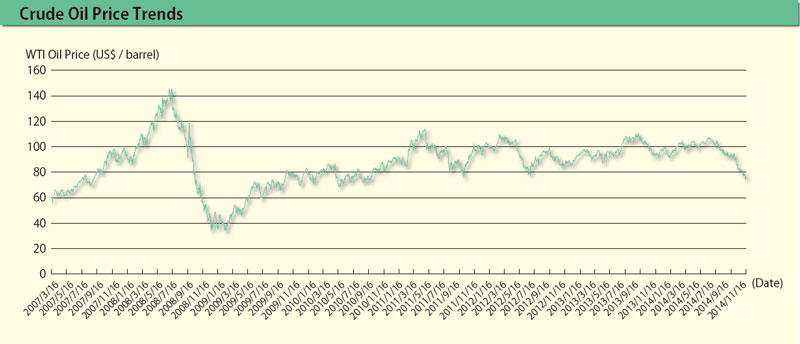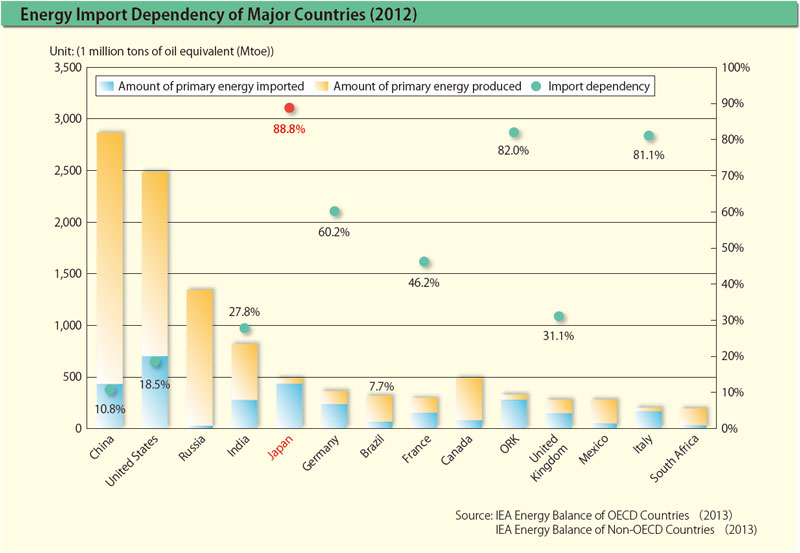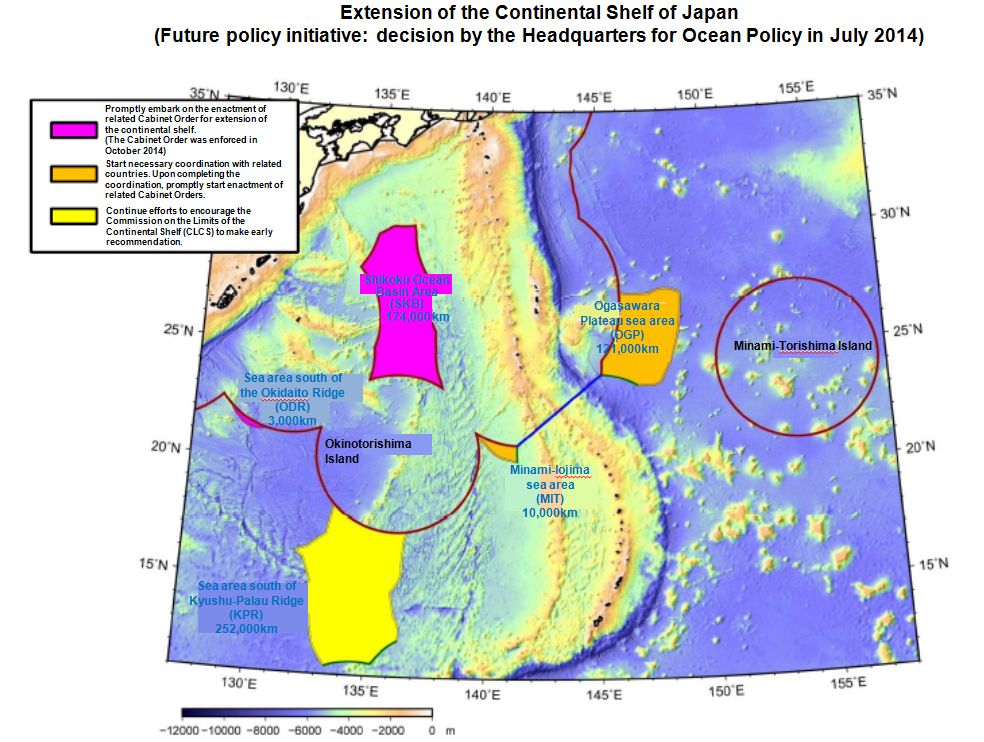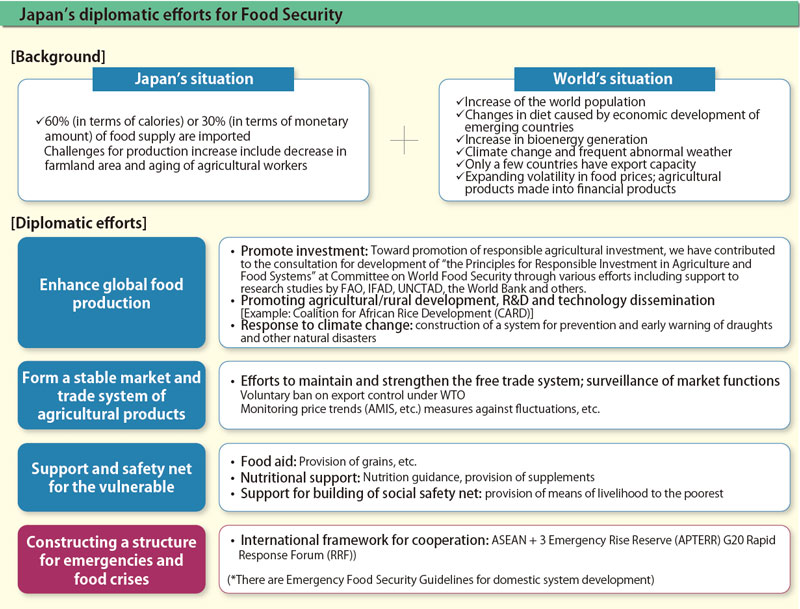Diplomatic Bluebook 2015
Chapter 3
Japan’s Foreign Policy to Promote National and Worldwide Interests
2.Building an Attractive Country Where People can Live Safely in Peace
(1) Securing a Stable Supply of Energy and Mineral Resources at Reasonable Prices
A. Current situation of energy and mineral resources at home and abroad
(a) Situation in the world
Crude oil prices fluctuated in 2014. Crude oil prices had remained at high levels in recent years, reflecting factors such as increase in energy demand in emerging countries and others, intensifying competition for natural resources, rise of resource nationalism, and changing situations in the Middle East. In the wake of the situation in Iraq in June 2014, the WTI oil benchmark touched a peak level of 107 US dollars per barrel at one point. The price, however, declined from the fall of the year because of various factors such as slowdown in oil demand due to economic stagnation in major countries and the relaxation of supply and demand caused by steady increase in oil production by non-OPEC member states which includes shale oil production by the US. The price dropped below the level of 50 US dollars per barrel in January. While the decline in oil prices bring benefits to energy consuming countries in the short term, it affects the financial conditions or new resource development in oil producing countries. Therefore, it is important to continue to keep a close watch over its medium- and long-term impact on energy security.
(b) Situation in Japan
The share of fossil fuels in Japan’s power generation reached about 90% after the Great East Japan Earthquake, while the number had been a little over 60% before the earthquake. It becomes increasingly important to make efforts to secure stable supply of energy as reasonable prices in a situation where the fuel procurement cost deteriorates the trade balance coupled with the depreciation of the yen. In this context, development of proactive resource-diplomacy and diversification of resource-supplying countries are described in the “Strategic Energy Plan” which was approved in a Cabinet meeting in April, as measures to promote comprehensive policies to secure resources in a stable manner.


B. Diplomatic efforts to ensure stable supply of energy and mineral resources at reasonable prices
Ensuring a stable supply of energy and mineral resources at reasonable prices forms a foundation for the vital economy of Japan and livelihood of the people. MOFA has been strengthening diplomatic efforts as follows.
(a) Strengthening of comprehensive and mutually-beneficial ties with resource-rich countries
In order to ensure a stable supply of energy and mineral resources, Japan has worked on the strengthening of comprehensive and mutually-beneficial ties with resource-rich countries by working on them at summit level or ministerial level and thorough cooperation utilizing ODA including technical cooperation and human resources development in the area of resources. In particular, since the inauguration of the Abe Administration, Prime Minister Abe, Foreign Minister Kishida and others visited major resource-rich countries in North America, the Middle East and Africa, Latin America and the Caribbean, and the Asia Pacific, and engaged in active resource energy diplomacy. In 2014, for example, Prime Minister Abe visited Africa (Mozambique), the Pacific (Australia, Papua New Guinea, etc.), Latin America and the Caribbean (Chile, Brazil, Mexico, etc.) in addition to the Middle East and Russia, and worked on these countries to seek cooperation in the field of resources.
Furthermore, as an outcome of efforts for the diversification of suppliers by September, the U.S. government approved exports of LNG as well as the construction and operational measures of all the LNG projects in the US in which Japanese companies are involved. The export of US LNG is expected to realize in FY 2016. In addition, LNG import from Papua New Guinea was also initiated from June 2014.
(b) Securing safety of transportation routes
There have been piracy incidents along the sea lanes stretching from the Middle East to Japan, through which approximately 90% of the total oil imports of Japan passes, and other internationally important sea lanes such as those off the coast of Somalia and the Gulf of Aden. With this in mind, Japan has supported the coastal countries such as enhancement of capabilities to police piracy, cooperation on information sharing among nations concerned, and development of navigation facilities. Japan has also been dispatching units of the Japan Self-defense Forces to the areas off the coast of Somalia and the Gulf of Aden to be engaged in escort operations for any country’s commercial ships (see Chapter 3, Section 1, 5(1) “The Oceans and Seas” for details).
(c) Gathering and analysis of resource-related information at the diplomatic missions overseas and others
With a view to strengthening the function of diplomatic missions abroad, “Special Assistants for Natural Resources” are assigned at 55 overseas diplomatic missions in 50 countries who work intensively for acquisition and stable supply of energy and mineral resources. Further, MOFA has held the “Strategic Meeting on Natural Resources” by gathering some officials who are assigned to the diplomatic missions overseas in countries which are important in terms of ensuring a stable supply of energy and mineral resources. There are active discussions over the current situations and future direction of the efforts for securing resources.
(d) Utilization of international fora and rules for market stabilization, emergency response and others
Japan has actively participated in various activities of the International Energy Agency (IEA) for international collaboration and cooperation toward a stable supply of energy. It endeavors to strengthen capability to respond to emergency such as disruption of oil supply, while working to grasp quickly and accurately such information as the trends in the global energy markets, medium- and long-term outlook for supply and demand, and the trends in resource-producing countries. With regard to LNG prices, Japan held the “LNG Producer-Consumer Conference 2014” (hosted by the Ministry of Economy, Trade and Industry and the Asia Pacific Energy Research Center (APERC)) in November following the same event last year, which is an international meeting gathering both producing and consuming countries of LNG. In the conference, participants shared recognition about the latest trends in both producers and consumers in LNG markets, and made discussions toward development of the market premised on securing stability and transparency of the market. In addition, Japan has supported the “Extractive Industries Transparency Initiative (EITI),” which is related to the appropriate development and use of finite energy and mineral resources. Furthermore, Japan advances international cooperation in implementing the Energy Charter Treaty (ECT), which provides for the promotion of free trade and transit of energy materials and products as well as for the promotion and protection of investments. In November, Japan held the “Energy Charter Treaty Forum” (hosted by MOFA) and provided an opportunity to promote understanding on the ECT and Japan’s overseas business activities.

C. Oceans and Seas (continental shelves and deep seabed)
As Japan is not abundant in energy and mineral resources on land, marine resources and natural resources buried in the continental shelf and the deep seabed in the surrounding waters are important from the perspective of securing stable sources and ensuring the sound development of the economy. With this, Japan is proceeding with necessary measures to secure maritime interests, based on the United Nations Convention on the Law of the Sea (UNCLOS).
With regard to defining the outer limits of the continental shelf beyond 200 nautical miles, Japan received recommendations from the Commission on the Limits of the Continental Shelf (CLCS) in 2012 to the effect that for four out of seven regions, for which Japan described in the submission for the extension of the continental shelf, a certain range of extension is approved, and followed by this, in October 2014, Japan established extended continental shelves in the Shikoku Basin and Southern Oki-daito Ridge Regions in accordance with the “Future Policy for Extending the Continental Shelf” decided by the Headquarters for Ocean Policy in July of that year. It was also addressed in the Future Policy that Japan would initiate coordination with the parties concerned regarding another two regions and make continuous effort in urging early recommendations for the remaining one region, on which no recommendations were made and were left to be deferred.
With regard to the deep seabed, in January 2014, the Japan Oil, Gas and Metals National Corporation (JOGMEC) and the International Seabed Authority (ISA) concluded a Contract for Exploration for Cobalt-Rich Ferromanganese Crusts6 in the deep seabed located offshore of south-east of Minami-Tori-Shima Island, through which Japan obtained an exclusive right to explore the mining area for 15 years.
- 6 Ferromanganese oxide including rare metals such as cobalt, nickel, and white gold, deposited on the flanks or summits of seamounts with a thickness of several to several tens of centimeters, similar to asphalt.
D. Efforts toward green growth and low carbon society
Through the use of renewable energy (solar, wind, biomass, geothermal, hydraulic, the use of oceans, etc.) and promotion of energy-efficiency, Japan has made contributions toward the realization of green growth and the promotion of low-carbon society in the international community including developing countries, (human resources development, providing know-how and expertise through the international framework, etc.).
With a view to diffuseing and promoting sustainable use of renewable energy, Japan has actively engaged in the International Renewable Energy Agency (IRENA) and it served the President of the Assembly in January 2015. As a part of our cooperation, Japan and IRENA jointly organized a training program and international seminar on renewable energy inviting government officials from Africa and the Pacific Islands countries.
(2) Ensuring Food Security
According to a recent UN report, the world population is estimated to increase to approximately 9.6 billion people by 2050, and it is accordingly requested to increase food production by about 70% from the current level. For Japan, which imports most of its food from abroad, ensuring world food security contributes to Japanese food security as well. While increasing domestic food production, it is necessary to promote world food production and establish stable agricultural product markets and trade.
According to the “State of Food Insecurity in the World 2014” (SOFI2014) issued by the Food and Agriculture Organization of the UN(FAO), the International Fund for Agricultural Development (IFAD) and the World Food Programme (WFP), about 810 million people are undernourished around the world. However, this figure indicates that the number of undernourished people has decreased by more than 100 million in the past 10 years, specifically by more than 200 million people since the 1990–1992 period, and “if appropriate and immediate efforts are stepped up”, the hunger target under the Millennium Development Goals (MDGs) to halve the proportion of undernourished people in developing regions by 2015 compared with 1990 will be within reach. International grain prices remain at a high level amid the situation where the prices may fluctuate subject to the weather or other factors. The international community including Japan has a responsibility to alleviate this appalling situation of people in developing countries suffering from food insecurity, and to contribute to the achievement of MDGs.

A. Efforts in the international framework concerning food security
Based on the “New Alliance for Food Security and Nutrition” (New Alliance) announced at the G8 Camp David Summit held in the US in 2012, Japan and the US have been working on the agenda together with the US as joint leading countries7 for Mozambique.
In the 5th Tokyo International Conference on African Development (TICAD V) held in Yokohama in 2013, Japan expressed commitments including the continuing implementation of the Coalition for African Rice Development (CARD), expansion of the eligible countries for the Smallholder Horticulture Empowerment and Promotion Unit Project (SHEP) Approach, support to establish food value chains, and the promotion of responsible agricultural investment. At the TICAD V Ministerial Meeting held in Cameroon in May 2014, Japan reported that these supporting measures had been taken.
Moreover, at the G20 Brisbane Summit held in Australia in November, Japan actively contributed to the adoption of the “G20 Food Security and Nutrition Framework,” which addresses an increase of responsible investment in food systems, an increase of incomes and quality employment in food systems, and an increase of productivity sustainably to expand the food supply as priority objectives. Japan also provides project-support services to the Agricultural Market Information System (AMIS), established at the G20 Cannes Summit held in France in 2011.
In September, the 3rd APEC Ministerial Meeting on Food Security was held in China with the main theme of “Strengthening regional cooperation and promoting food security,” through which the “Beijing Declaration on APEC Food Security” including the importance of establishing food value chains advocated by Japan was adopted. In June, in cooperation with the OECD, Japan hosted the “APEC Food Security Workshop” (the 50th Anniversary Event of Japan’s Accession to the OECD) in Tokyo. Through these activities, the parties deepened discussions focused on international efforts toward the establishment of food value chains in the Asia-Pacific Region.
In addition, in the ASEAN+3 (Japan, China, and the ROK) Summit Meeting held in November, Prime Minister Abe explained Japan’s assistance of rice for Laos and the Philippines, which were conducted in accordance with the ASEAN plus Three Emergency Rice Reserve (APTERR) Agreement enacted in 2012. In response, support for the importance of the system and further expectations were expressed. Prime Minister Abe also asked for the relaxing and lifting of restrictions on imports from Japan.
- 7 Countries leading the development and execution of the cooperative framework together with recipient countries in order to accelerate the cooperation framework by country covered by the New Alliance.
B. Japan’s efforts to promote the “Responsible Agricultural Investment”
While promoting international agricultural investments aimed at increasing global food production, bearing in mind that large-scale “land grabbing” in developing countries was a concern, Japan advocated the concept of “Responsible Agricultural Investment” at the G8 L’aquila Summit in 2009, so that investments should be promoted in the manner to create the trilateral mutually-beneficial situation for recipient countries, local communities including small-holders, and investors. In April 2010, four international organizations (FAO, IFAD, United Nations Conference on Trade and Development (UNCTAD), World Bank) adopted the “Principles for Responsible Agricultural Investment (PRAI).” Taking the PRAI into account, the “Principles for Responsible Investment in Agriculture and Food Systems” was adopted at the Committee on World Food Security (CFS) in October 2014. In order to reflect the study cases on discussions as well as to utilize those for application of the principles in the future, Japan has continuously and strenuously contributed to global efforts through such measures as a financial aid to “Forward-looking Research and Analysis Programme for Responsible Agricultural Investment,” which has been operated by the four international organizations since 2013.
C. Fisheries (including tuna fishing and whaling issues)
Japan is one of the major fishing nations and consuming countries of marine production in the world, and plays an active role in addressing appropriate conservation and management of fishery resources. In July 2014, Japan became a contracting party to the Southern Indian Ocean Fisheries Agreement (SIOFA).
With regard to tuna, Japan, as the largest consuming country, has joined all regional fishery management organizations (RFMOs) for tuna, and led discussion to strengthen measures for conservation and management of the resources. In particular, regarding Pacific bluefin tuna, which are concerned to be depleted, the Western and Central Pacific Fisheries Commission (WCPFC) decided, by the initiative of Japan, to decrease the catch of bluefin tuna weighing 30kg or less by half from the average of the years 2002–2004. Further, the Inter-American Tropical Tuna Commission (IATTC) decided to reduce the total catch of bluefin tuna by 40%. With regard to Atlantic bluefin tuna, a recovery of the stock was recognized as an achievement of conservation management measures by the International Commission for the Conservation of Atlantic Tunas (ICCAT) so far, and it was decided to increase the total allowable catch gradually.
The Japanese eel (Anguilla japonica) has been concerned to be in the decline in stocks and was designated as an endangered species by the International Union for Conservation of Nature and Natural Resources (IUCN) in June. Japan with China, the ROK and Chinese Taipei, after several consultations, issued a joint statement in September, which included considering a possible establishment of legally binding framework on conservation and management of eel species.
With regard to whaling, Japan cancelled the second phase of Japanese Whale Research Program under Special Permit in the Antarctic (JARPAII) in accordance with the afore-mentioned judgment of the International Court of Justice (ICJ) (see Chapter 3, Section 1, 7 “The Rule of Law in the International Community” for details). Japan submitted a proposal for New Scientific Whale Research Program in the Antarctic Ocean, which was developed in light of the reasoning and conclusion of the ICJ judgment, to the Scientific Committee of the International Whaling Commission (IWC) in November, and is aiming to implement the program from FY2015. In September, the IWC biennial meeting was held in Slovenia for the first time since it was decided to be held it every second year. Japan took a position on the sustainable use of fishery resources including cetaceans and asked for understanding and support for that position.
(3) Globalization of the Japanese Market and Human Resources (Inward Direct Investments)
In the Strategy of Global Outreach addressed in the “Japan Revitalization Strategy (revised in 2014),” which was approved at a Cabinet Meeting in June 2014, as KPI (Key Performance Indicator), Japan set a target to double foreign companies’ direct investment in Japan to 35 trillion yen by 2020 (17.8 trillion yen as of the end of 2012). In order to accomplish the objective, it is crucial to develop a governmental framework including the establishment of a system necessary for the improvement of the investment environment in Japan, responding to the needs of foreign companies. With the “Council for Promotion of Foreign Direct Investment in Japan” acting as a “control tower”, Japan is committed to exploring and attracting new investment cases and promoting the reform of the systems with unified efforts across the ministries and agencies.
The Council for Promotion of Foreign Direct Investment in Japan promotes activities of discovering and attracting investments. In collaboration with organizations such as the Council on Economic and Fiscal Policy, the Council for Industrial Competitiveness, the Council for Regulatory Reform, and the Special Zone Advisory Council, Japan continuously makes further progress in taking additional measures such as the regulatory and institutional reforms contributing to investment environment and supporting measures to expand investment effectively. At the same time, Japan promotes the translation of Japanese laws, as part of the development of information infrastructure to promote inward direct investments.
MOFA, in collaboration with the Japan External Trade Organization (JETRO), makes use of international conferences and the diplomatic missions overseas, including embassies and consulates-general, in order to appeal to foreign companies’ executives and conduct publicizing or dissemination (active PR activities on the websites of its diplomatic missions overseas, etc.), through which such activities as locating potential investors to Japan are strengthened. With regard to the promotion of individual cases, Japan strengthens the one-stop support functions of JETRO in collaboration with the relevant ministries and agencies and creates opportunities for investment or alliance between Japanese medium-sized and small and medium-sized enterprises (SMEs) and foreign companies. Furthermore, in collaboration with JETRO, MOFA provides a full range of support to local governments, which are active in attracting foreign companies. Japan conducts top-level sales by prime minster or minister strategically in collaboration with outstanding local governments, as shown in the opening of the “Investment Japan Seminar” (JETRO) during Prime Minister Abe’s visit to the UK (in May) and the US (in September).
